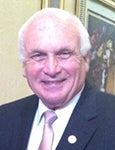Mental health head speaks at rotary
Published 12:05 am Wednesday, August 5, 2015
Thirty days into his new job as commissioner of the Alabama Department of Mental Health, Jim Perdue knows one thing for certain.
He has tough tasks ahead of him.
“We have more acronyms in mental health than we have money,” he told Andalusia Rotarians on Tuesday.
The former Crenshaw County probate judge, who for years chaired the board of the Andalusia-based South Central Alabama Mental Health, said mental health reform has to be in Alabama’s future.
“Most people when they think of mental health, think of mental commitments,” he said. “Rarely do we find a mentally ill person who requires commitment who doesn’t require some substance to live on a regular basis. We have four mental health hospitals in the state; three are closed. We’ve got to do something about that.”
Perdue said he plans to work with the Hospital Association to get more beds for mental health.
“Basically, we have a math problem,” he said. “So many patients and so few beds.”
Perdue said he plans to lobby the legislature not just for level services, but to increase services.
“I can tell y’all are thinking, ‘There he goes. Tax and spend,’ ” he said. “But I can mention one town – LaFayette, La., – you have a problem that’s out there.”
He was referring to a recent mass shooting in a theater there. The shooter, who took his own life, had most recently lived in Alabama.
There are 75 to 100 mental commitments in Covington County every year, he said. There are currently more than 8,000 petitions for commitments in the state. And that’s just the tip of the iceberg, he said.
“A family who is rich enough takes care of it themselves. They get admitted, not committed. And yet, the symptoms, and diagnosis may be exactly the same.”
A relatively new law puts mental health clients who have been finally committed on a list of those who cannot buy guns. But Perdue said even with the new law, he doesn’t
expect to see an end to people walking into a public place with a gun.
“It’s not difficult to get the legislature to understand right now. They’re sympathetic,” he said. “But at the same time, budgeting is a hard process.”
Even as he spoke the legislature was working on a General Fund budget that could include sharp cuts to state agencies.
“If they cut our budget 10 percent, which 10 percent do I need to cut,” he said. “I’m not going to cut at Taylor Hardin, which is our secure facility for those patients not guilty by reason of insanity.
“It’s all men. The crimes they’ve committed will make your stomach turn. So if I take my cut, I’m not gonna say, ‘Give me 15 people”
Similarly, those patients who are in Bryce’s, the state mental hospital, can’t just be sent home.
“We have 150 who have attempted suicide or attempted murder. They may be psychotic, or maybe paranoid schizophrenic. They have a treatable disease. It’s no different than cancer. You don’t cure it but you treat it.”
The department also provides services for the intellectually or developmentally disabled.
“Once you start treating them, the law says they are entitled,” he said. “If you stop treating them, the federal government will come down your throat. We have 6,000 people under our care, and 3,000 people waiting.”
If the department is cut, he said, the cuts will have to come in community services.





